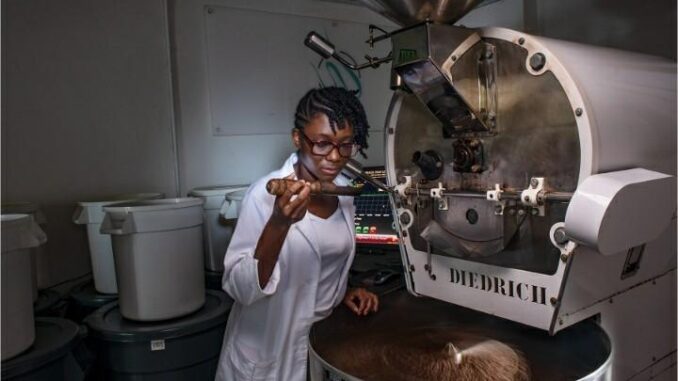
We find out how Jalisa Als became the first female coffee roaster in Barbados, and what it has been like to help put her country back on the map for coffee.
BY VASILEIA FANARIOTI
SPECIAL TO BARISTA MAGAZINE ONLINE
Photos courtesy of Jalisa Als
You don’t often hear about Barbados when exploring the specialty-coffee industry. Once a coffee origin, Barbados is now more known for its tourism industry. However, that is slowly changing with the rise of people like Jalisa Als.
Jalisa grew up in Saint Philip, a parish in Barbados. Her passion for creation sparked her interest in makeup artistry. Today, Jalisa works as a head roaster at Wyndhams Coffee and is helping to put Barbados back on the map as a country offering high-quality coffee.
We sat down with Jalisa to chat about her unlikely path into coffee and what it’s like being the first female roaster in her country.
Vasileia Fanarioti: So Jalisa, how does one who is interested in a career in makeup end up becoming a coffee roaster?
Jalisa Als: Well, two weeks after I passed my makeup course, I started work at Wyndhams Coffee part time. A family friend who was working as a coffee equipment technician told me the company needed help with packing the roasted coffee. I met with the owners Dominic and Mandy Wyndham-Gittens and pretty much dove right in. At first, my job was packaging the coffee and helping Dominic log the roasting sheets.
What was the turning point for switching from makeup to coffee?
When I got the opportunity to watch Dominic roast, I was intrigued by the whole process. I would watch him every day and listen to the different cracks, then take in the smells—those heavenly smells of fresh hay, bread baking, and the toasted sugar.
Soon after, Dominic invited me to taste the coffee during cupping, and I was so surprised that the coffee tasted like chocolate and nuts. Up until then, I only drank instant coffee. Then one day, while roasting, Dominic asked me to take over, and the rest is history. I got brought in full time as a packager and a proportion roaster, with one rule: DON’T BURN DOWN THE ROASTERY!
Do you feel that coffee roasting allows you to express your creativity?
Absolutely! Creating flavors is the aspect I love the most. It kind of reminds me of makeup art, especially when it comes to blending. Coffee beans can be blended together to create amazing flavors—like a more developed Brazilian coffee can add a deeper, rich dark chocolate finish to a blend with extra texture on the tongue.
So, what is it like for a woman to be a coffee roaster in Barbados?
Wyndhams has always strived to bring strong female leadership to the forefront. I feel blessed to have people like Mandy and Dominic as leaders, as they see something in their staff and give us the knowledge, tools, and freedom to explore it.
It’s been amazing to participate as a Bajan female coffee roaster in interviews, roastery tours, and client tastings. It’s actually overwhelming for me at times to receive so much support and recognition for my role in this industry as a woman and a Bajan.
Outside of the company, our culture is more geared towards coffee drinking. So, because I usually smell like coffee, I’m asked “Do you work at a coffee shop?“ The upside is, I then get to talk about roasting. The downside is, it’s usually brushed off as nothing because it’s not understood, which can be frustrating at times. But I feel that this is slowly changing.
It’s good to hear that it’s changing! Your comment actually brings me to my next question. What is the coffee culture like in Barbados?
When I first started at Wyndhams, I watched as Dominic and Mandy tried to open up a tea-drinking island to the world of coffee. The coffee culture in Barbados has been slow to progress, but it’s happening nevertheless. More people are moving away from darkly roasted coffees, burnt and bitter tasting notes, and experimenting with specialty coffee.
However, for Bajans, the overly sweet, milky coffees are still the most popular on the island. At Wyndhams we try to do our part every day by broadening our customers’ knowledge of coffee, from very bitter, overly roasted coffee to special coffee. We have progressed from being a small island-based roastery to exporting award-winning coffee around the world.
What are your professional goals and dreams for the future?
One of my biggest dreams is about to come true as I’m going on my first origin trip in Colombia. I’ve always wanted to visit a coffee farm and experience the processing of green coffee and deepen my knowledge of it. It would be nice to get more recognition for what I do and greater appreciation for the quality we produce. In the last two years we have won nine Great Taste awards in the UK and I’m really proud of that.
Is there anything you’d like to share with the readers of Barista Magazine?
Watching and being a part of the growth of this company has taught me to see the bigger picture—to be a progressive thinker, not just thinking inside the perimeters of Barbados, but to touch the world. My advice would be to explore, create, drink more specialty coffee, and don’t panic. Also, surround yourself with people that can see your potential, even when you can’t see it.
ABOUT THE AUTHOR
Vasileia Fanarioti (she/her) is a freelance copywriter and editor with a primary focus on the coffee niche. She has also been a volunteer copywriter for the I’M NOT A BARISTA NPO, providing content to help educate people about baristas and their work. You can follow her adventures at thewanderingbean.net.

